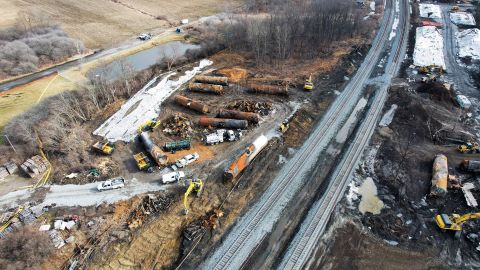CNN
—
Ohio’s governor visited the toxic train derailment site in East Palestine for an update Wednesday on the removal of hazardous waste as concerns fester over the long-term health effects of the wreckage.
Crews were expected to begin removing the train tracks as soon as Wednesday to clean the hazardous waste under them nearly four weeks after the fiery February 3 crash and subsequent release of the dangerous chemical vinyl chloride from its cars, Gov. Mike DeWine’s office said.
The governor and his wife also were due to visit two contaminated waterways – Sulphur Run and Leslie Run – for an update on water testing and streambed sediment washing; the waterways are not sources of tap water, which East Palestine gets from deep, steel-encased wells.
Authorities by then had expected repairs to be made to some containment, collection and stream treatment systems at the derailment site, a Tuesday news release from DeWine’s office said. Minor damage caused by recent heavy rain may have allowed a small amount of heavily diluted contaminants to flow from one stream into another, it said.
Meantime, the US Environmental Protection Agency is deploying a mobile laboratory to conduct “real time” air monitoring and sampling in the village, regional EPA Administrator Debra Shore said Tuesday. The mobile lab, known as a TAGA bus, will allow for air samples to be analyzed on site and deliver results quickly, instead of waiting on an off-site lab.
The EPA also is exploring different kinds of soil sampling as East Palestine residents express concerns about possible dioxins – a kind of environmental pollutant – in the soil, Shore added.
The new steps are being taken as anxiety lingers among residents about whether symptoms like rashes and headaches may be tied to the Norfolk Southern wreck and as scientists say tests in East Palestine show unusually high levels of some chemicals.
A data analysis from the EPA’s measurements of pollutants released following the derailment suggests some levels of monitored chemicals are higher than normally would be found in the area, according to scientists from Texas A&M and Carnegie Mellon universities.
If the levels of some chemicals remain high, it could be a problem for residents’ health in the long term, the scientists say.
The EPA and local government officials have repeatedly said their tests show the air quality in the area is safe and the chemicals should dissipate.
Air monitoring data shows levels of monitored chemicals “are below levels of concern for adverse health impacts from short-term exposures,” an EPA spokesperson told CNN on Monday, adding the risks referenced by the analysis “assume a lifetime of exposure, which is constant exposure over approximately 70 years.
“EPA does not anticipate levels of these chemicals will stay high for anywhere near that.”

EPA Administrator Michael Regan remains confident in the EPA’s testing, he told CNN on Tuesday.
“Let me be clear – EPA is testing for all toxic chemicals,” Regan said. “We have a complete inventory of everything that was on that train, and everything we’re monitoring for and testing for, we understand the levels of potential adverse health impacts from those toxics or any byproducts.”
As things stand:
• The air in 578 homes has been tested, and the EPA reported detecting no contaminants associated with the derailment;
• Test results from 19 private wells found no evidence of contaminants linked to the train derailment;
• EPA tests of public drinking water “confirm that there is no indication of risk to East Palestine public water system customers,” the agency said.
Norfolk Southern will provide EPA with an analysis of how much contamination there is and steps the company is taking to clean it up, Regan said.
“The cleanup is just getting started,” he said. “We gave the company an order to clean this mess up – they have a few more days to present a work plan to us.”
Although testing has shown East Palestine’s municipal water supply is safe for drinking, Regan advised children and adults not to play in the town’s creeks and streams.
Due to the recent rains, Norfolk Southern reported its onsite contaminated liquid storage bins are now approximately 90% full, “necessitating the use of a bulk transfer method for the contaminated liquid,” DeWine’s office said in its release.
The bulk transfer method involves offloading wastewater into railcars at rail yards in Lordstown, Ohio, rather than taking the wastewater directly to licensed hazardous waste disposal facilities, the news release said.
As residents continue to question the safety of their air and water, nearly 140 people have sought help at a public health clinic that opened February 21 in East Palestine to address concerns related to the toxic wreck. The clinic is working with the US Centers for Disease Control and Prevention to help study the health impacts to residents of the derailment.
Across the state line, the Pennsylvania Department of Health is opening a health resource center in Beaver County so residents “can talk to public health experts, sign up to have their well water tested, and learn about available resources from professionals there to help,” Gov. Josh Shapiro tweeted Tuesday.
While testing and removal of contaminated liquid and soil from the derailment site continue, the EPA is developing measures to give authorities – including in other states – a “heads up” about incoming waste shipments and to keep Norfolk Southern accountable for the material it is moving, Regan said.
Indiana Gov. Eric Holcomb objects to the EPA administrator’s decision to move hazardous waste from East Palestine to Indiana, he said, adding there “has been a lack of communication” with him and other Indiana officials about the decision.
Holcomb is the latest official to raise concerns about the shipments.
Last week, the EPA ordered Norfolk Southern to temporarily stop the shipments so it could review the company’s disposal plans. Officials in Texas and Michigan had complained they didn’t get any warning that waste from the toxic crash site would be shipped to their states.
Meanwhile, two Texas officials said they consider having the water processed in their community to be a way they can help the people of East Palestine. “This is what Texans do; we help our neighbors in need,” Deer Park Mayor Jerry Mouton, Jr. and Harris County commissioner Adrian Garcia said in a statement.
An environmental disposal company, Texas Molecular, will handle more wastewater in Deer Park. Mouton, Jr. and Garcia say they don’t believe the news that more tainted water is heading to their area is a problem.
“Our offices have been in regular contact with Texas Molecular since the very beginning, and based on their transparency and demonstrated expertise, as well as permitted compliance in the field of waste disposal, we are confident in their ability to dispose of the water safely,” they said.
The EPA identified several locations that can take contaminated waste from the derailment site, including most recently Ross Incineration Services in Grafton, Ohio, and Heritage Environmental Services in Roachdale, Indiana.
So far, some 280 tons of contaminated soil and 319,002 gallons of liquid waste have gone to licensed hazardous waste disposal facilities in Michigan. About 1.25 million gallons of liquid waste from the crash went to a Texas facility, and two 28-cubic-yard boxes of contaminated soil were sent this week to Heritage Thermal Services, a licensed hazardous waste disposal facility in East Liverpool, Ohio, according to a Monday update from DeWine’s office.
East Palestine Mayor Trent Conaway addressed concerns about the shipments from his town to waste facilities. “They knew the facilities were in their states, and I understand their concern. But at the same time, it’s governed by the federal EPA, so it should be safe for all the citizens there,” he said Tuesday.
Note:- (Not all news on the site expresses the point of view of the site, but we transmit this news automatically and translate it through programmatic technology on the site and not from a human editor. The content is auto-generated from a syndicated feed.))



